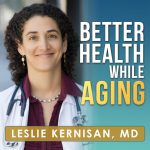
In This Episode:
Dr. K talks with Carla Perissinotto, MD, Associate Chief for Geriatrics Clinical Programs at UCSF and a nationally known expert on loneliness in aging. Her landmark 2012 study found that loneliness is common among older adults, and is associated with greater declines while aging. They discuss:
- What surprised her about her study findings
- The difference between being alone, being lonely, and being socially isolated
- How social contact and loneliness can impact health while aging
- When to worry about someone who lives alone
- Whether trying to age in place might increase the risk of social isolation
- Different services and options that can help maintain social connections even when it’s hard to leave home
- What to do if you’re worried about an older relative who might be lonely
- How older adults might plan ahead to reduce their risk of loneliness and social isolation
- How loneliness can put aging adults at risk for financial exploitation
- Promising approaches to reducing loneliness in aging
Related Resources:
- Scholarly papers:
- Related new stories:
- Services & Innovations:
- Institute on Aging Friendship Line
- Covia.org Well Connected (formerly Senior Center Without Walls)
- Find your local Department of Aging and Adult Services: Eldercare.gov
- AARP Connect2Affect
- Prepare for Your Care
- Age UK



David Block MD, PhD says
Thank you so much for this podcast. It is very helpful. For some old folks, like myself, who are used to learning from and interacting with the printed page, could you please include a written timeline so that I might be able to follow the succession of topics throughout the 41 minutes without trying to remember what was said 10 or 15 minutes in the past? (For me, it’s like looking back to previous paragraphs or pages where I’ve made notes). Also, depending on how you imagine your audience (are we academics? older folks in a therapeutic community? English as a first language? level of education?), you might think about adjusting your level of discourse. For example, the concept of ‘prevalence’ comes up a few times: what does that mean? So if the podcast is an academic-style lecture, no problem: you figure your MPH students know that stuff. But if I’m an older bloke who has to retrieve definitions while listening, well, I might have a problem because I worry I’m missing something and I might get frustrated; old folks hate to think we’re missing stuff and we embarrass easily. If you were my doctor and we were talking about MY OWN isolation vs loneliness, I could interrupt you and clarify our thinking, but I can’t on a podcast where time hurries by more quickly than in the mirror. Would you think about using a kind of informal TED-talk conversation format over a kitchen table – which is where ideas get traded around for us older folks? In other words, you and Carla reprise this in your kitchen, as if it were a home visit (not a ‘billable’ Medicare visit, but an emotionally authentic moment of engagement) – kind of like what Ina Garten does in her cooking show. We trust Ina Garten because she takes us into her own personal kitchen and feeds her own friends and husband what she teaches us to make. She uses context rather than academic degrees from the Culinary Institute to establish her claim to believability – her ‘ethos’. For your podcast, Carla gets much more believable around Minute 25, once she starts to talk about herself and her own mom and dad. She has engaged you, I think, because you start to respond to her with unconscious expressions of understanding and assent (“Ahhh” and “Ohhh” and “Mmmmhmm”): we sense the functioning of your own respiratory system, your own spontaneous sympathetic neurological outflow. So we develop trust in you by enchaining your own very personal responses. She establishes trust in us by making herself vulnerable. (Consider,for example, the “popcorn and salami” last meal image – very human, or the feeding-tube confession). But we humans are often “foveate learners”: we want to (literally) see the point as well as the paralinguistic ‘utterances’ (the eyebrows, so to speak). Thus, the kitchen table, where it is very hard to hide thoughts, feelings, body language, and agendas. Well, my mom always knew, anyway.
Anyway, thank you very much. You have taken on a profound responsibility. I appreciate it. I’m no podcast maven but I will learn and I will listen (i.e.,subscribe).
Leslie Kernisan, MD MPH says
Thanks for this comment and all this constructive feedback. Your points are all very valid.
I would love to be able to offer a listening guide or even a transcript, the main barrier in doing so is that this would require time, funding, or both, and I am currently limited on both fronts.
Similarly, although I would love to be able to help guests present in a way that’s more approachable and useful to a lay audience — and I’d like to improve my own approach as well — for now, I’m often not able to do so.
I hope to eventually be able to make the improvements you suggest. Thank you for listening.
Elizabeth Gould says
Dr. Kernisan,
I am amazed that you are able to do what you do for this podcast. I have been listening for many months now and I always enjoy the topics and expert presenters as well as the related resources.
Thank YOU!
Leslie Kernisan, MD MPH says
Thank you! I’m so glad you’ve been enjoying the podcast.
Please do leave a rating and review on iTunes, if you get a chance. This helps more people find the podcast.